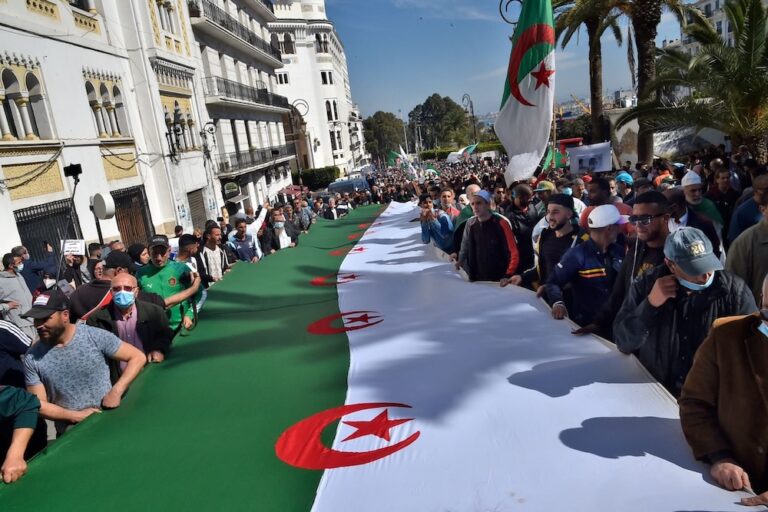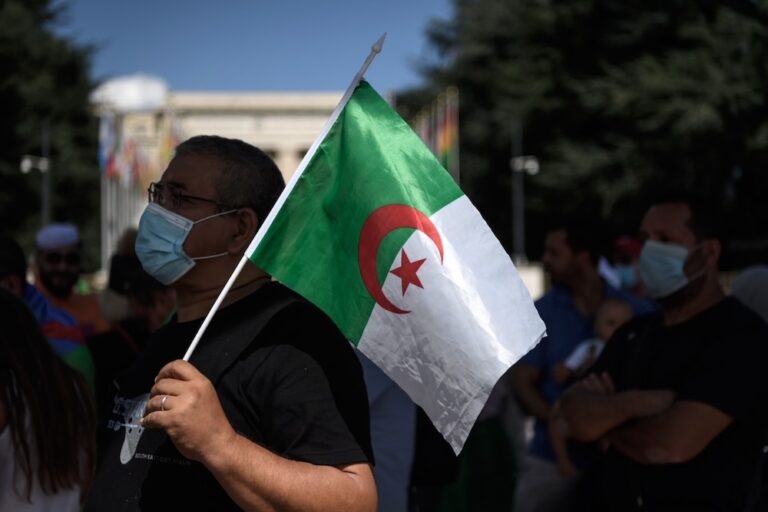(RSF/IFEX) – The following is an RSF press release: 12 April 2000: For immediate release Abdelaziz Bouteflika’s first year in power: Media under close scrutiny A year after the controversial election of Abdelaziz Bouteflika, press freedom is still not guaranteed in Algeria. Even during the presidential election campaign, he made some uncomplimentary remarks about the […]
(RSF/IFEX) – The following is an RSF press release:
12 April 2000: For immediate release
Abdelaziz Bouteflika’s first year in power: Media under close scrutiny
A year after the controversial election of Abdelaziz Bouteflika, press freedom is still not guaranteed in Algeria. Even during the presidential election campaign, he made some uncomplimentary remarks about the country’s press, describing journalists as “tayabet el hammam” (gossips), which led to some sharp exchanges with the private press.
The climate of fear resulting from ten years of civil war, in which assorted armed groups claiming allegiance to the radical Islamist movement have clashed haphazardly with the various security forces, is still putting a brake on the freedom to inform. Despite the president’s efforts to achieve national reconciliation, many attacks have been carried out in several parts of the country. More than a thousand people have died in the violence since 15 April 1999, according to press calculations. Areas that have been the scene of massacres have now been placed under strict military surveillance, which means that neither Algerian nor foreign journalists can carry out any serious investigations there. In any case, most Algerian dailies simply print the official version of events and blame all murders on Islamist groups.
Broadcasting remains under total state control, with radio and television churning out government propaganda. President Bouteflika has even described himself as the “editor” of the public media. In an interview with the Arabic-language channel MBC in November 1999, he said: “Private operators will not be able to invest in broadcasting and start radio and television stations as long as the state of emergency declared in 1992 remains in force.” The organic law on information, which was last amended by the government on 9 September 1998, was supposed to be discussed in parliament during autumn 1998, but at the start of April 2000 the debate had still not been scheduled. Although the proposals reaffirm the principle of press freedom, they give cause for concern on several points. The notions of “preserving public order” and “insults in the press” have been used specifically to restrict press freedom. The vagueness of these legal definitions may also open the door to all kinds of abuse. Moreover, although journalists’ work is less restricted by direct censorship than in the past, the government’s stranglehold on printing works and official advertising imposes a burden of self-censorship on most journalists and newspaper publishers.
The private press under government pressure
The Algerian authorities are trying to prove to international public opinion that freedom of speech still exists in Algeria. Even so, the government and the military make their influence felt by putting various forms of pressure on privately owned newspapers. As well as putting administrative obstacles in their way, the state tries to stifle some titles through printing works, over which it has complete control. Sodipresse, the only private printing works, owned by Saad Lounes, was closed down by the authorities in December 1999. The company had printed the dailies El Ouma, Le Matin and Demain l’Algerie after the state printing works refused to handle them. It is also common for a newspaper to be forced to settle all its debts to the printer after a report or investigation upsets the government or one of its factions. The state printing works refused to handle Demain l’Algerie, part of the press group belonging to General Betchine (who was opposed to Abdelaziz Bouteflika’s candidacy in the April 1999 presidential elections), after 13 May 1999. Later the same fate befell the Arabic-language daily El-Alam El-Siyassi, which was forced to suspend publication in December 1999.
Yet in recent months, there have been attempts to set up other private printing companies. Issaad Rebrab, a businessman close to the president and the Union for Culture and Democracy, who owns the daily Freedom and the distribution company Nouvelles Messageries Algériennes, is reported to be about to import a rotary press. General Mohamed Betchine’s press group is said to have similar plans.
Attribution of official advertising is used as another way of putting pressure on publications, or of buying their loyalty. About 80% of advertising comes from public companies and has to go through the National Agency for Publishing and Advertising (ANEP). The agency, which has the task of deciding where to place the advertising, does so more often than not according to subjective criteria. The managing director, Mr Khomri, was appointed by Abdelaziz Bouteflika himself during the summer of 1999.
Starting legal proceedings is a useful way for the authorities to silence journalists who refuse to toe the line. Since April 1999, editors and journalists from El Watan, Le Soir d’Algérie, Le Matin and Al Khabar have been brought before the courts charged with a variety of offences. Sometimes pressure comes from within the newspaper. Djillali Hadjaj, a reporter with the daily El Watan, was forced to resign by his own management in December 1999 because he was taking too great an interest in corruption in state institutions.
The foreign press under surveillance
Not many foreign titles are available in Algeria. The few that have obtained official permission to be sold on Algerian newsstands are careful not to criticise the government for fear of losing that privilege. Very few visas are granted to allow regular and special correspondents from foreign newspapers to work in Algeria. Some reporters who have criticised the government are systematically refused entry to Algeria. Jean-Pierre Tuquoi of the French daily Le Monde, José Garçon of the French daily Libération and Jean Baptiste Rivoire of the French news agency Capa, for example, have been unable to obtain visas for several years because of reports or features that displeased the authorities. In January 2000 a TV crew from the channel France 2 filmed an interview with Mohamed Benaicha, one of the leaders of the fundamentalist Army of Islamic Salvation. Since then, all journalists from the channel have been refused visas. Foreign journalists who do obtain permission to go to Algeria are forced to have a police escort with them throughout their stay. The journalists say that besides being a nuisance, the escort is there to keep an eye on them rather than to protect them.
A very strict watch is kept on permanent correspondents. The former correspondent of the French weekly Jeune Afrique, Mohamed Sifaoui, suffered serious harassment and was threatened by soldiers because he tried to investigate certain murders and cases of people who had “gone missing”. Fearing for his life, he went into exile at the end of 1999. On 28 March 2000 Walid Zeroug, a photographer working as a stringer for the French agency IMA Presse, was arrested at his home by six men belonging to the DRS (the former military security service). He was held at a barracks in Ben Aknoun, without being charged, and was eventually freed on 2 April.
One piece of good news emerged recently for organisations working to defend human rights and freedom of speech. On 28 March 2000, the Algerian government invited four non-government organisations, including Reporters Sans Frontières (RSF), to carry out an observation mission in Algeria.
No news of four journalists who disappeared between 1994 and 1997
Four journalists are recorded as missing in Algeria: some after being kidnapped by armed groups; others by the security services, which have denied arresting any of them.
Kadour Bouselham, correspondent of the government daily Horizons in the Mascara region of western Algeria, disappeared on 29 October 1994. According to various reports collected by RSF, he was kidnapped by an armed fundamentalist group. A “turncoat” terrorist apparently told the authorities that Kadour Bouselham had had his throat cut after being tortured, and was then buried in a forest near Mascara. Mohamed Hassaine, correspondent of Alger Republicain in the region of Khemis El-Khechna, near Algiers, was kidnapped by an armed group as he was leaving his home in March 1994. His family has had no news of him since.
Other journalists have gone missing after being kidnapped by people believed to belong to the Algerian security services. On 6 May 1995 Djamil Fahassi, a journalist with the Algerian radio station Chaîne III and a sympathiser with the Islamic Salvation Front (FIS), disbanded in 1992, was arrested by members of the security services, according to witnesses. He has not been heard of since then, despite a thorough investigation by his wife. On 12 April 1997, Aziz Bouabdallah, a journalist with the Arabic-language daily El-Alam El-Siyassi, was taken from his home by men in police uniform. On 18 April 1997 a report by Ghania Oukazi in the daily El Watan claimed that he had been arrested by police officers because of an article “deemed to be libellous”. The next day El-Watan contradicted the report, claiming that the journalist had been kidnapped by an armed fundamentalist group. Aziz Bouabdallah has given no sign of life since then. In a letter sent to RSF on 30 June 1997, the Algerian embassy in Paris said that “following investigations conducted under the supervision of the ministry of justice, it has transpired that the person concerned is not known to the security services, is not the subject of an arrest warrant, and has not been arrested or detained”.
Murders of journalists still unsolved
Since 1993, 57 journalists and about 30 other media employees have been killed. Responsibility for most of the murders has been claimed by the various armed groups belonging to the fundamentalist movement, who regard Algerian media workers as “henchmen of the government” and “enemies of Islam”. Nevertheless, the circumstances of some murders remain to be clarified and have raised a number of questions. Algerian journalists claim that certain clans close to the authorities and certain elements in the security services are behind the murders. In October 1995 Omar Belhouchet, editor of the daily El Watan, told the French television channel Canal + : “There are some journalists who are a nuisance to the government. And I wouldn’t be surprised to learn that some of my colleagues had been murdered by their men.” At the time, his words led him to court on a charge of libel. Most of the presumed killers of journalists have been tried in their absence. According to the official version, some of the killers were shot dead after clean-up operations by the army.
Recommendations
Reporters Sans Frontières calls on the Algerian authorities to:
1. Cancel the interministerial decree, signed on 7 June 1994 by the interior and communication ministers, about the handling of “security-related” information;
2. Pass a law on information which seeks to protect the freedom to inform and to be informed, in accordance with Algeria’s international undertakings, and in particular the International Covenant on Civil and Political Rights, which the government ratified on 12 September 1989;
3. Take the necessary police, legal and administrative measures to enable thorough searches to be made for journalists reported missing;
4. Change the way state advertising is allocated by the National Agency for Publishing and Advertising (ANEP);
5. Guarantee all sections of society access to the broadcast media;
6. Issue visas and accreditations to foreign journalists who request them, without restrictions, and allow them to go about their work unhindered, particularly by leaving them free to move around on their own without a security services escort.


